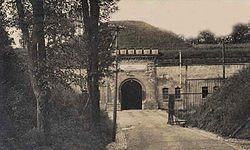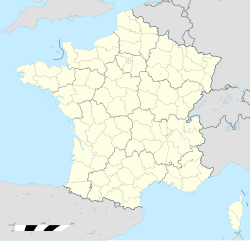Fort Saint-Privat
| Fort Saint-Privat | |
|---|---|
 |
|
| Coordinates | 49°27′14″N 6°49′59″E / 49.454°N 6.833°E |
| Type | Von Biehler fort |
| Site history | |
| Built | 1872–1875 |
| Fate | Unused |
Fort Saint-Privat (Feste Prinz August von Württemberg before 1919) is a fortification near Metz. Part of the , it had its baptism of fire in late 1944 during the Battle of Metz.
Fort Saint-Privat is part of Metz' first fortified belt, designed during the Second French Empire by Napoléon III. The belt consists of Fort Saint-Privat (1870), Fort de Queuleu (1867), Fort des Bordes (1870), Fort de Saint-Julien (1867), Fort Gambetta, Fort Déroulède, Fort Decaen, Fort de Plappeville (1867) and the St. Quentin fortifications (1867). Most of the forts were unfinished in 1870, when the Franco-Prussian War began. Under German control, Metz initially had a German garrison of 15,000 to 20,000 men, exceeded 25,000 before World War I and gradually became the premier stronghold of the German Reich.
The fort, built by German engineers from 1872 to 1875, was designed in a style similar to the "detached fort" concept developed by Hans Alexis von Biehler in Germany. The goal was to form an enclosure around Metz of forts and artillery, with a variety of guns and spaces between them.
In 1890, the forts were staffed by German Corps XVI troops from Metz and Thionville. The garrisoned the fort before 1914. Invested by the French army in 1919, the Prinz August von Württemberg Fort was renamed Fort Saint-Privat. It was soon encompassed by the perimeter of the Metz-Frescaty Air Base, which was developed after World War I. The fort was captured in 1940 by the Wehrmacht, which held it until 1944. It is no longer in use.
...
Wikipedia

